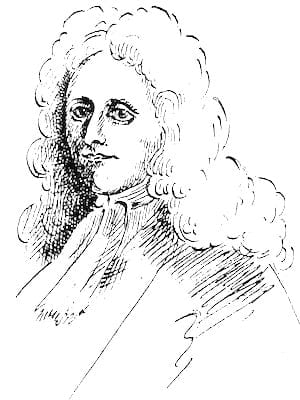John Floyer
Sir John Floyer (1649 – 1734) was an English physician.
Sir John Floyer is remembered chiefly for his invention of the pulse watch, which provided the first exact method for counting the pulse; his treatise on asthma and as an advocate for cold bathing.
Floyer practiced medicine at the height the Restoration period or ‘scientific revolution‘ which overturned the authority in science of the Middle Ages and the ancient world; at the very crossroads between medieval traditionalism (Galenism) and the application of a new experimental approach to science. ‘…the day was drawing to a close when men could take all knowledge for their province;but the sun set in splendour‘ (Gunn, 1936).
Biography
- Born 3 March 1649 Hints, Staffordshire, England. Second son of Richard Floyer (Lord of the Manor, Hints Hall)
- 1664 – Queen’s College, Oxford. Graduated BA (1668), MB (1674) and MD (1686)
- 1680 – MD, moved to Lichfield and prospered as a physician
- 1686 – Knighted by James II (political services)
- Died 1 February 1734
Key Medical Attributions
Pulse-watch (1707)
According to legend, Chinese sphygmology was founded by the Emperor Hoamti 2500 B.C., and to have been very skilled in the art. Knowledge of Chinese pulse-lore was first brought to Europe by Jesuit missionary, Father Boym in 1652 (translating the books of Wang-cho-ho on the pulse); published in Latin by Cleyer in 1682 as Specimen medicinae Sinicae.
Floyer studied the pulse and developed a watch to measure the pulse with London watchmaker, Samuel Watson. It enabled him to become the first physician to study the pulse in his clinical practice. [The Physician’s Pulse-watch Volume I 1707, Volume II 1710.]
Asthma and pulmonary emphysema (1698)
Floyer published ‘A Treatise of the Asthma – in four parts‘ in 1698. It was the first major English monograph on the subject and proved to be an important milestone in the development of our understanding of this disease.
Floyer separated asthma from other pulmonary disorders; he considered that the cause of the dyspnoea was bronchial constriction, due to spasm and regarded the spasm to be tonic, more akin to catalepsy than to the clonic convulsion of epilepsy.
Additionally he gave the first detailed description of emphysema based on a dissection he performed on a ‘broken-winded mare‘, relating his findings to human disease.
‘I have assign’d the immediate Cause of the Asthma, to the Straitness, Compression, or Constriction of the Bronchia…‘ Floyer 1698
Cold bathing and hydrotherapy
Floyer held strong convictions regarding cold bathing and was able to persuade ‘worthy and obliging gentlemen‘ to contribute towards erecting a cold bath at Lichfield.
‘Physicians oft find it a difficult task to conquer the aversions of nice patients and to persuade them to use those medicines to which they have not been accustomed, until they have first convinced them that their medicines are both safe and necessary. I expect to find the same aversion to cold bathing.’ Floyer 1702
Medical Eponyms
Pulse-watch (1707) Floyer, renowned for his work on the study of the pulse, developed a watch to measure the pulse with London watchmaker, Samuel Watson. It enabled him to become the first physician to study the pulse in his clinical practice. He published The Physician’s Pulse-watch Volume I 1707, Volume II 1710. The modern day medical equivalent is the Doplr Pulse Watch
Controversies
Physician heal thyself: Floyer suffered from bronchial asthma, which led him to make a special study of the condition. He did not neglect the opportunity of making detailed observations on his own symptoms and how they were influenced by environment and seasons, as well as by treatment.
Touched by the Queen on the Johnson: Floyer wrote his many books while living in Lichfield. A local bookseller, Richard Johnson (who printed several of his books), consulted Floyer regarding his son Samuel, a sufferer from scrofula. On Floyer’s advice, the lad was taken to London and ‘touched‘ by Queen Anne. The patient was the great lexicographer, Doctor Samuel Johnson.
Potentially fatal cold bathing? A diarist wrote of a deceased clerical friend ‘…his death was chiefly owing to an infirmity caused by his throwing himself, about midnight in winter time, into the river, upon reading Sir John Floyer of Cold Baths.’
Notable Quotables
- Floyer had a keen interest in the preservation of the health of the aged and wrote the first book on geriatrics, in which he observed that ‘Every man is a fool or becomes his own Physician at 40 or 50 years of age‘ (Medicina Gerocomica, 1724).
- Floyer was a tad eccentric being described as ‘fantastic, whimsical, pretentious, research-minded, and nebulous‘ (Lindsay, 1951).
Major Publications
- Floyer J. A Treatise of the Asthma: divided into four parts. London: Wilkin. 1698
- Floyer J. A relation of two monstrous pigs, with the resemblance of humane faces, and two young turkeys joined by the breast. Philosophical Transactions 1699;259;21:431-435.
- Floyer J. The ancient ψυχρολουσία [psychrolousia] revived: or, An essay to prove cold bathing both safe and useful. 1702
- Floyer J. Observations on the class of sweet tastes: made by comparing the tastes of sweet plants with monsieur L’emery’s chemical analysis of them, in his treatise of drugs. Philosophical Transactions 1702;279;23:1160-1172.
- Floyer J. The Physicians Pulse-watch: or, An Essay to Explain the Old Art of Feeling the Pulse, and to Improve it by the Help of a Pulse Watch. Volume I. 1707.
- Floyer J, Baynard E. ψυχρολουσία [Psychrolousia]: or, The history of cold bathing: both ancient and modern. Innys, Manby: London, 1709
- Floyer J. The Pulse-watch: or, An Essay to discover the causes of diseases, and a rational method of curing them by feeling of the pulse. Volume II. 1710.
- Floyer J. Medicina gerocomica: or, The Galenic art of preserving old men’s healths. 1724
References
- Gunn JA. Sir John Floyer (1649-1734) Hydrotherapist. In: British Masters Of Medicine London, 1936.
- Lindsay L. Sir John Floyer (1649-1734). Proc R Soc Med. 1951 Jan; 44(1): 43–48. [PMC2081588]
- Evan Bedford D. The ancient art of feeling the pulse. Br Heart J. 1951 Oct; 13(4): 423–437. [PMC503691]
- Townsend GL. Sir John Floyer (1649-1734) and his study of pulse and respiration. J Hist Med Allied Sci. 1967 Jul;22(3):286-316. [PMID 4862497]
- Townsend GL. Sir John Floyer (1649-1734) and the discovery of pulmonary emphysema. Mayo Clin Proc. 1969 Jul;44(7):484-8. [PMID 4892252]
- Gibbs DD. Sir John Floyer, M.D. (1649-1734). Br Med J. 1969 Jan 25; 1(5638):242–245. [PMC1982095]
- Gibbs DD. The physician’s pulse watch. Med Hist. 1971 Apr; 15(2): 187–190. [PMC1034144]
- Sakula A. Sir John Floyer’s A Treatise of the Asthma (1698). Thorax. 1984 Apr; 39(4): 248–254. [PMC459778]
- Cohen SG. Sir John Floyer (1649-1734) British physician and pioneer clinical investigator. Allergy Proc. 1995 Nov-Dec;16(6):328-9. [PMID 8747321]

eponym
the person behind the name

